Babel - Movie Review
 Babel 2006
Babel 2006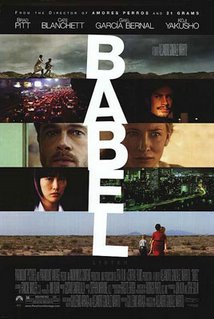 A young American couple on vacation in Morocco seem trapped by their inability to communicate to each other. Their housekeeper back in California speaks to their two children in Spanish, embracing them as her own. Unable to communicate fully with her father, a young deaf girl in Tokyo immerses herself in a world of playful antagonism in order to be heard.
A young American couple on vacation in Morocco seem trapped by their inability to communicate to each other. Their housekeeper back in California speaks to their two children in Spanish, embracing them as her own. Unable to communicate fully with her father, a young deaf girl in Tokyo immerses herself in a world of playful antagonism in order to be heard.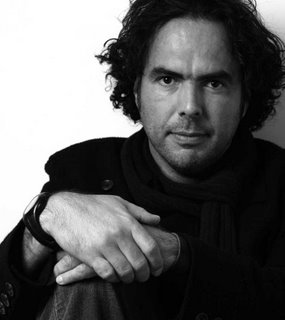 When Alejandro González Iñárritu first staked his cinematic claim with “Amores Perros”, we knew we were in the presence of a talented director. His contribution to part of “The Hire” series of short films made for BMW and starring our future husband Clive Owen was outstanding – it was called “Powder Keg” and featured superlative turns by Owen, Stellan Skarsgård and Lois Smith, go watch it now!
When Alejandro González Iñárritu first staked his cinematic claim with “Amores Perros”, we knew we were in the presence of a talented director. His contribution to part of “The Hire” series of short films made for BMW and starring our future husband Clive Owen was outstanding – it was called “Powder Keg” and featured superlative turns by Owen, Stellan Skarsgård and Lois Smith, go watch it now!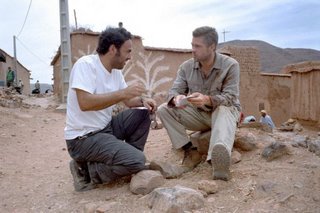 Then came his full length English language film debut, “21 Grams”. It was a strong well received film which played upon a similar plot device used in his breakthrough hit “Amores Perros” – a horrible car accident that brings together the lives of disparate souls. Sadly many people harped on comparing the two films. We think they were both terrific and completely different in tone.
Then came his full length English language film debut, “21 Grams”. It was a strong well received film which played upon a similar plot device used in his breakthrough hit “Amores Perros” – a horrible car accident that brings together the lives of disparate souls. Sadly many people harped on comparing the two films. We think they were both terrific and completely different in tone. But moving on to our present film by the Mexican auteur. “Babel” is another multistoryline passion play. This time, the interconnected storylines cover a far wider canvas, approaching a global scale. Not global on a political level (although there are some very nice asides addressing that turgid landmine of egos.), but rather focusing on the interpersonal.
But moving on to our present film by the Mexican auteur. “Babel” is another multistoryline passion play. This time, the interconnected storylines cover a far wider canvas, approaching a global scale. Not global on a political level (although there are some very nice asides addressing that turgid landmine of egos.), but rather focusing on the interpersonal. Since the legendary days of Nimrod and his Tower of Babel, (for all you Christian readers out there – Mazel Tov!) mankind has struggled to communicate across the barriers of various languages. We still remember the days when a long distance telephone call would take about seventeen days to set up, and some bitch operator would call you at four in the morning to alert you that your call had gone through. Needless to say, by then your dying uncle in Swaziland had died. But we digress.
Since the legendary days of Nimrod and his Tower of Babel, (for all you Christian readers out there – Mazel Tov!) mankind has struggled to communicate across the barriers of various languages. We still remember the days when a long distance telephone call would take about seventeen days to set up, and some bitch operator would call you at four in the morning to alert you that your call had gone through. Needless to say, by then your dying uncle in Swaziland had died. But we digress.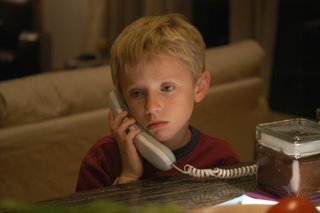 Alejandro González Iñárritu has chosen to focus on three storylines and their various sidestepping moments to tell a terrifically cinematic and emotionally powerful tale about the lack of communication in the communication age.
Alejandro González Iñárritu has chosen to focus on three storylines and their various sidestepping moments to tell a terrifically cinematic and emotionally powerful tale about the lack of communication in the communication age. For when the traveling American couple, played with emotional veracity and ferocity by Brad Pitt and Cate Blanchett find themselves in the middle of an international scandal, the fallout reaches to Mexico and Tokyo and beyond.
For when the traveling American couple, played with emotional veracity and ferocity by Brad Pitt and Cate Blanchett find themselves in the middle of an international scandal, the fallout reaches to Mexico and Tokyo and beyond.  Brad and Cate portray Richard and Susan, a couple escaping the anguish of their crumbling marriage after the loss of a child. They cannot seem to reconnect, despite having two small children back home who depend on them. The children are left in the care of their housekeeper, Amelia played with wonderful authenticity by Adriana Barraza. The children are lovable and believable little tykes portrayed by Nathan Gamble and Elle Fanning. Yes, related to that other Fanning.
Brad and Cate portray Richard and Susan, a couple escaping the anguish of their crumbling marriage after the loss of a child. They cannot seem to reconnect, despite having two small children back home who depend on them. The children are left in the care of their housekeeper, Amelia played with wonderful authenticity by Adriana Barraza. The children are lovable and believable little tykes portrayed by Nathan Gamble and Elle Fanning. Yes, related to that other Fanning. As Richard and Susan board a bus filled with a bunch of Brits on holiday, a bullet pierces the window and lodges in Susan’s clavicle. Needless to say, they stop the bus. Aided by their tour guide, they escape to the guide’s local village in order to seek the care of a doctor. Sadly, the doctor turns out to be a veterinarian. Not so useful. While Richard attempts his best to deal with the complete lack of infrastructure within this remote mountain village, he manages to secure a call back to the states to alert Amelia.
As Richard and Susan board a bus filled with a bunch of Brits on holiday, a bullet pierces the window and lodges in Susan’s clavicle. Needless to say, they stop the bus. Aided by their tour guide, they escape to the guide’s local village in order to seek the care of a doctor. Sadly, the doctor turns out to be a veterinarian. Not so useful. While Richard attempts his best to deal with the complete lack of infrastructure within this remote mountain village, he manages to secure a call back to the states to alert Amelia.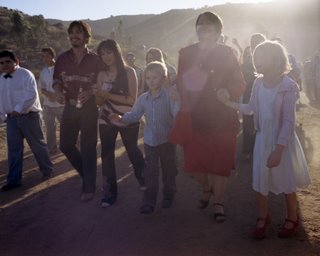 Amelia takes the news in stride, promising to care for the children as if they were her own. For in many ways they are. Like many young urban couples, Richard and Susan have entrusted the care of their children completely to an illegal immigrant. Penny pinching crackers that they are. You just know they pay her in live chickens. But that’s another story. For Amelia has concerns of her own.
Amelia takes the news in stride, promising to care for the children as if they were her own. For in many ways they are. Like many young urban couples, Richard and Susan have entrusted the care of their children completely to an illegal immigrant. Penny pinching crackers that they are. You just know they pay her in live chickens. But that’s another story. For Amelia has concerns of her own.  One of her sons is getting married back in Mexico, and obviously she must attend the ceremony. Her nephew portrayed by our future husband Gael García Bernal comes to collect her, and finds himself in charge of three passengers instead of the one. For Amelia has attempted in vain to find someone to take charge of the kids for the day, and so she must transport them illegally back into Mexico. Against the parents wishes and at far greater risk than she could ever imagine.
One of her sons is getting married back in Mexico, and obviously she must attend the ceremony. Her nephew portrayed by our future husband Gael García Bernal comes to collect her, and finds himself in charge of three passengers instead of the one. For Amelia has attempted in vain to find someone to take charge of the kids for the day, and so she must transport them illegally back into Mexico. Against the parents wishes and at far greater risk than she could ever imagine. All throughout these two storylines, we meet a young deaf girl in Japan, played effortlessly and poignantly by young Rinko Kikuchi. The stifling complications of adolescence are made tenfold by her inability to fully communicate her desires to her loving but distant father portrayed with a quiet power by Kôji Yakusho. So, instead she immerses herself in the afterschool life of her fellow classmates as they gambol their way through the arcades, shopping centers and playgrounds of Tokyo. The only problem is that Chieko is one frustrated young girl, longing for romance or emotion or perhaps a quick fondle in the back of a bus for all we know.
All throughout these two storylines, we meet a young deaf girl in Japan, played effortlessly and poignantly by young Rinko Kikuchi. The stifling complications of adolescence are made tenfold by her inability to fully communicate her desires to her loving but distant father portrayed with a quiet power by Kôji Yakusho. So, instead she immerses herself in the afterschool life of her fellow classmates as they gambol their way through the arcades, shopping centers and playgrounds of Tokyo. The only problem is that Chieko is one frustrated young girl, longing for romance or emotion or perhaps a quick fondle in the back of a bus for all we know. Being that this is the work of González Iñárritu, the goings can only get worse before the characters earn their moment of salvation or what passes for it in this very fine, yet very somber drama.
Being that this is the work of González Iñárritu, the goings can only get worse before the characters earn their moment of salvation or what passes for it in this very fine, yet very somber drama. The powerful cast works wonders with the complicated roles they have to play. None of the characters are particularly noble or heroic and yet are all forced to make choices that would be unbearable for most of us. What emerges from the chaos of the miscommunications are several sterling performances and three incredible ones.
The powerful cast works wonders with the complicated roles they have to play. None of the characters are particularly noble or heroic and yet are all forced to make choices that would be unbearable for most of us. What emerges from the chaos of the miscommunications are several sterling performances and three incredible ones.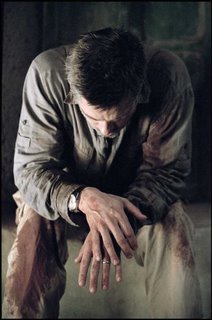 Brad Pitt in particular has never been better. Here, with a shade of grey added to his temples and the star charisma dialed down to almost zero, he pulls out all of his emotional truth in the role of the father / husband who witnesses his greatest nightmare in a foreign land with almost no hope of respite in sight.
Brad Pitt in particular has never been better. Here, with a shade of grey added to his temples and the star charisma dialed down to almost zero, he pulls out all of his emotional truth in the role of the father / husband who witnesses his greatest nightmare in a foreign land with almost no hope of respite in sight.
 His tears are genuine, so is the crack in voice as he begins to realize that the end is desperately near for his wife, before they ever get the chance to heal their emotional wounds. It is his finest hour, and one that should not be forgotten come Awards time.
His tears are genuine, so is the crack in voice as he begins to realize that the end is desperately near for his wife, before they ever get the chance to heal their emotional wounds. It is his finest hour, and one that should not be forgotten come Awards time.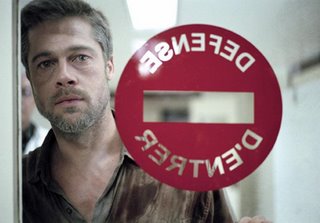 Make room on the Awards short list for Adriana Barraza as Amelia. Her heartwarming and always believable turn as the proud woman who takes her demeaning day job in stride in order to help provide for her own family across the infamously debated border is simply stunning. And in many ways, the most shocking moments occur in her side of the story. For after her son’s wedding, she mistakenly agrees to return to the U.S. with an obviously inebriated nephew who becomes involved in a shouting match with the border patrol.
Make room on the Awards short list for Adriana Barraza as Amelia. Her heartwarming and always believable turn as the proud woman who takes her demeaning day job in stride in order to help provide for her own family across the infamously debated border is simply stunning. And in many ways, the most shocking moments occur in her side of the story. For after her son’s wedding, she mistakenly agrees to return to the U.S. with an obviously inebriated nephew who becomes involved in a shouting match with the border patrol.
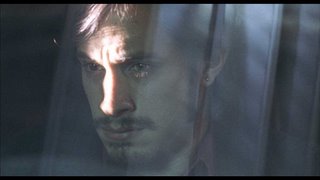 He makes the incredible decision to attempt to outrace them, fearing his own previous misdemeanor charges will land them in trouble. He has no idea. Forced to abandon his aunt and her two very young charges in the middle of the desert at the dead of night, their nightmare is just beginning.
He makes the incredible decision to attempt to outrace them, fearing his own previous misdemeanor charges will land them in trouble. He has no idea. Forced to abandon his aunt and her two very young charges in the middle of the desert at the dead of night, their nightmare is just beginning. Adriana Barraza is a marvel as the simple woman who must muster the strength of a true heroine in order to save all three lost souls in the barren wasteland.
Adriana Barraza is a marvel as the simple woman who must muster the strength of a true heroine in order to save all three lost souls in the barren wasteland. And finally, but certainly not least – young Rinko Kikuchi is mesmerizing as the orally challenged Chieko. We have seen frustrated teenagers in films for decades now, but rarely have we witnessed a total portrait of a young lady in such emotional pain it brings her to the brink of madness. Not a true round the bend kind of screaming madness, but one that shatters the world around her by breaking all the known rules in a desperate attempt to be understood.
And finally, but certainly not least – young Rinko Kikuchi is mesmerizing as the orally challenged Chieko. We have seen frustrated teenagers in films for decades now, but rarely have we witnessed a total portrait of a young lady in such emotional pain it brings her to the brink of madness. Not a true round the bend kind of screaming madness, but one that shatters the world around her by breaking all the known rules in a desperate attempt to be understood. Ultimately that is what “Babel” is about. The need and the right to be understood. González Iñárritu has quickly become one very notable director for the integrity of his own voice, the beauty of his images and the unequalled power of his vision. There were scenes that literally had us holding our breaths and shielding our eyes for their carnal truths. This film is not for the weak of heart, or the slight of brain. It is a thoughtful, carefully laid out and complicated joy of moviemaking that respects the audience as thinking adults and entertains us like the movie lovers we hope are.
Ultimately that is what “Babel” is about. The need and the right to be understood. González Iñárritu has quickly become one very notable director for the integrity of his own voice, the beauty of his images and the unequalled power of his vision. There were scenes that literally had us holding our breaths and shielding our eyes for their carnal truths. This film is not for the weak of heart, or the slight of brain. It is a thoughtful, carefully laid out and complicated joy of moviemaking that respects the audience as thinking adults and entertains us like the movie lovers we hope are. A special mention must go the production team, for González Iñárritu is also a lover of imagery and a man of taste. Rodrigo Prieto who lit the very handsome “Brokeback Mountain” among others has such a rich palette of colors at his talented fingertips, we marvel at his technique. Film editors, Douglas Crise and Stephen Mirrione should expect to be tossed two Oscars for their intricate and perfectly timed work. And another “Brokeback Mountain” alum, Gustavo Santaolalla contributes another haunting score that reflects perfectly the various locales and nationalities.
A special mention must go the production team, for González Iñárritu is also a lover of imagery and a man of taste. Rodrigo Prieto who lit the very handsome “Brokeback Mountain” among others has such a rich palette of colors at his talented fingertips, we marvel at his technique. Film editors, Douglas Crise and Stephen Mirrione should expect to be tossed two Oscars for their intricate and perfectly timed work. And another “Brokeback Mountain” alum, Gustavo Santaolalla contributes another haunting score that reflects perfectly the various locales and nationalities. If you haven’t already, run out and see “Babel”. It is one of the best films this year, with some of the most powerful moments in many a year. Bless you all!
If you haven’t already, run out and see “Babel”. It is one of the best films this year, with some of the most powerful moments in many a year. Bless you all!
Directed by Alejandro González Iñárritu
Written by Guillermo Arriaga
Based on an idea by Alejandro González Iñárritu & Guillermo Arriaga
Starring
Brad Pitt as Richard
Cate Blanchett as Susan
Mohamed Akhzam as Anwar
Adriana Barraza as Amelia
Elle Fanning as Debbie
Nathan Gamble as Mike
Gael García Bernal as Santiago
Clifton Collins Jr. as Officer at Border Crossing
Michael Peña as John, Border Patrol
Rinko Kikuchi as Chieko
Kôji Yakusho as Yasujiro
Cinematography by Rodrigo Prieto
Film Editing by Douglas Crise & Stephen Mirrione
Original Music by Gustavo Santaolalla
Costume Design by Michael Wilkinson
Production Design by Brigitte Broch
Art Direction by Rika Nakanishi
Labels: Movie Review

 By now, if you haven’t heard of professional memoirist
By now, if you haven’t heard of professional memoirist  Augusten Burroughs was the child of woman whose quest for fame and adulation became the starting point for her voyage of self discovery that left no room for her marriage or her child. In an inspired bit of casting,
Augusten Burroughs was the child of woman whose quest for fame and adulation became the starting point for her voyage of self discovery that left no room for her marriage or her child. In an inspired bit of casting,  Moving on. Which is exactly what young Augusten is forced to do once his parents’ acrimonious marriage is torn apart by Dierdre’s voyage of selfishness. To which she is indebted to her therapist, one Dr. Finch portrayed by
Moving on. Which is exactly what young Augusten is forced to do once his parents’ acrimonious marriage is torn apart by Dierdre’s voyage of selfishness. To which she is indebted to her therapist, one Dr. Finch portrayed by  When Dierdre and her teenage son, portrayed by
When Dierdre and her teenage son, portrayed by  The mother is portrayed by the criminally misused
The mother is portrayed by the criminally misused  The eldest daughter is Hope, one prissy uptight twat that communicates with her cat, named Freud . . . stay with us, during REM sleep mode and dresses straight out of a “
The eldest daughter is Hope, one prissy uptight twat that communicates with her cat, named Freud . . . stay with us, during REM sleep mode and dresses straight out of a “
 For Deirdre has apparently come to the realization through her therapy sessions that she must devote her life to channeling her anger, allowing her creative juices to flow, and relinquish her parental control to the Finches in order to provide Augusten with some “stability”. Finally, an answer to whether or not Deirdre is sane or not! She’s not.
For Deirdre has apparently come to the realization through her therapy sessions that she must devote her life to channeling her anger, allowing her creative juices to flow, and relinquish her parental control to the Finches in order to provide Augusten with some “stability”. Finally, an answer to whether or not Deirdre is sane or not! She’s not. And thank God for that! For while there are many things to dislike about “Running With Scissors”, the towering performance by Annette Bening is most definitely not one of them. She is a force of nature, in full mercurial bitch goddess mode, savoring each outlandish request made from the screenwriter and director – Ryan Murphy of “
And thank God for that! For while there are many things to dislike about “Running With Scissors”, the towering performance by Annette Bening is most definitely not one of them. She is a force of nature, in full mercurial bitch goddess mode, savoring each outlandish request made from the screenwriter and director – Ryan Murphy of “ Now, while we have enjoyed a few episodes of “Nip / Tuck”, we are keenly aware that not every writer / director working for the Boob Tube demographic should be allowed free reign behind a major motion picture. While Ryan may have an eye for sarcastic visual flair and a rather unhealthy preponderance for heavy usage of seventies
Now, while we have enjoyed a few episodes of “Nip / Tuck”, we are keenly aware that not every writer / director working for the Boob Tube demographic should be allowed free reign behind a major motion picture. While Ryan may have an eye for sarcastic visual flair and a rather unhealthy preponderance for heavy usage of seventies  It seems a shame that George Lucas ever created his teen memorabilia sensation of 1973, for more bad movies have been made attempting to eschew the real charms and sense of period that Lucas achieved with his heavy pop score to the now classic “
It seems a shame that George Lucas ever created his teen memorabilia sensation of 1973, for more bad movies have been made attempting to eschew the real charms and sense of period that Lucas achieved with his heavy pop score to the now classic “ All of which is a damn shame, considering the top notch cast which also includes
All of which is a damn shame, considering the top notch cast which also includes  We don’t object to unsavory material. We don’t reject the overreaching eccentric natures of the family in question. We do however categorically reject the notion that a voyage of self discovery begins with mocking and ends with ridiculing. There is no payoff scene, wherein young Augusten achieves a sense of clarity about his strange predicament. There are only a series of vignettes designed to titillate and provoke shock.
We don’t object to unsavory material. We don’t reject the overreaching eccentric natures of the family in question. We do however categorically reject the notion that a voyage of self discovery begins with mocking and ends with ridiculing. There is no payoff scene, wherein young Augusten achieves a sense of clarity about his strange predicament. There are only a series of vignettes designed to titillate and provoke shock. Which is what makes Annette Bening’s performance all the more extraordinary. Legend has it that
Which is what makes Annette Bening’s performance all the more extraordinary. Legend has it that  Which brings us to the curious imbalance at the heart of this piece. For a memoir that purports to trace the evolution of one scarred young man’s childhood – it is curiously uninvolved with its hero. We think young Joseph Cross delivers a believable performance that manages to hit all the right marks, but his story is so peripheral to the chaos at the Finch household, or the engulfing theatrics of Deirdre’s quest that he might as well be a disembodied voice. It is a mistake if we are meant to care for this lost boy. What is not a mistake is the casting of Annette Bening – for all the films faults and there are many, her grand turn makes this voyage down a candy colored jukebox lane worth the trip. Bless you all!
Which brings us to the curious imbalance at the heart of this piece. For a memoir that purports to trace the evolution of one scarred young man’s childhood – it is curiously uninvolved with its hero. We think young Joseph Cross delivers a believable performance that manages to hit all the right marks, but his story is so peripheral to the chaos at the Finch household, or the engulfing theatrics of Deirdre’s quest that he might as well be a disembodied voice. It is a mistake if we are meant to care for this lost boy. What is not a mistake is the casting of Annette Bening – for all the films faults and there are many, her grand turn makes this voyage down a candy colored jukebox lane worth the trip. Bless you all! Written and Directed by Ryan Murphy
Written and Directed by Ryan Murphy Marie Antoinette 2006
Marie Antoinette 2006 When Sofia Coppola burst upon the collective cinema consciousness, it was as the replacement for Winona Ryder in her father’s coda to the legendary “Godfather” saga. We all know how well that acting debut turned out. Who would have guessed that a decade and a half later, she would emerge as perhaps the most prominent female director working today? Certainly not us.
When Sofia Coppola burst upon the collective cinema consciousness, it was as the replacement for Winona Ryder in her father’s coda to the legendary “Godfather” saga. We all know how well that acting debut turned out. Who would have guessed that a decade and a half later, she would emerge as perhaps the most prominent female director working today? Certainly not us. Her directorial debut, “
Her directorial debut, “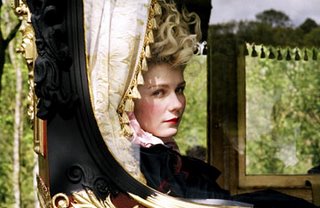 When Sofia announced that her follow up to her lauded work would be the life story of the legendary carb loving French queen, Marie Antoinette, many were surprised. Not us. Knowing full well, the depths of her fathers influence and guidance over the years, we knew this young lady was not only immersed in film history but completely aware of the potential power of histories’ narrative.
When Sofia announced that her follow up to her lauded work would be the life story of the legendary carb loving French queen, Marie Antoinette, many were surprised. Not us. Knowing full well, the depths of her fathers influence and guidance over the years, we knew this young lady was not only immersed in film history but completely aware of the potential power of histories’ narrative. Basing her film biopic on the recent notable biography by
Basing her film biopic on the recent notable biography by  She wheedled her way into filming many of her scenes on the actual premises, the incredible
She wheedled her way into filming many of her scenes on the actual premises, the incredible 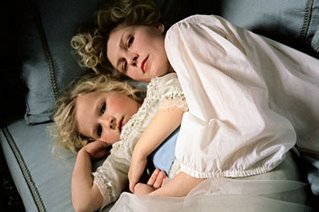 For us, the grand and glorious news about this latest cinematic take on Marie Antoinette is the success of the casting, the brilliant control and blossoming magic of Sofia Coppola’s direction, the superb production values and a completely unexpected emotional resonance. We were expecting an interesting take on the doomed French royalty from the stunning trailers blasting 80’s New Wave music. What we were not expecting was the most enjoyable film going experience this year.
For us, the grand and glorious news about this latest cinematic take on Marie Antoinette is the success of the casting, the brilliant control and blossoming magic of Sofia Coppola’s direction, the superb production values and a completely unexpected emotional resonance. We were expecting an interesting take on the doomed French royalty from the stunning trailers blasting 80’s New Wave music. What we were not expecting was the most enjoyable film going experience this year.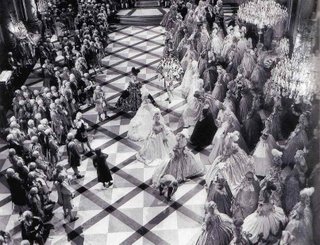 Marie Antoinette is certainly no stranger to film. Actresses as diverse and talented as
Marie Antoinette is certainly no stranger to film. Actresses as diverse and talented as 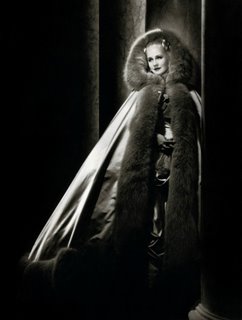 We recently had the opportunity to view Norma Shearer’s Oscar nominated performance in the MGM extravaganza of 1938, and were pleasantly surprised to rediscover one of the best performances from the famed First Lady of MGM. The emotional depths she achieves in her final scenes were Miss Shearer’s finest hour on film. And
We recently had the opportunity to view Norma Shearer’s Oscar nominated performance in the MGM extravaganza of 1938, and were pleasantly surprised to rediscover one of the best performances from the famed First Lady of MGM. The emotional depths she achieves in her final scenes were Miss Shearer’s finest hour on film. And  As for little Miss Dunst, we were a bit terrified she lacked the acting chops for this demanding role. While we are big fans of
As for little Miss Dunst, we were a bit terrified she lacked the acting chops for this demanding role. While we are big fans of 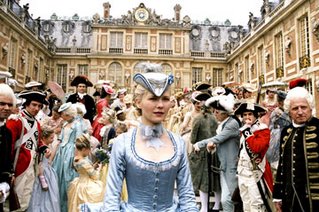 Lost amidst the glory and splendor of France, Marie Antoinette must learn the language, customs, rules, social hierarchy and her expected position in her new life. Saddled with a man-child as a husband and completely ill at ease among the devilishly deceptive ladies at court, she slowly learns to play the role of the proper Princess and ultimately the Queen of France. And while this could easily have become a plodding history lesson, Sofia Coppola is smart enough to trust the source material and turns this biopic into one filled with humor, intrigue, romance and yes, adventure.
Lost amidst the glory and splendor of France, Marie Antoinette must learn the language, customs, rules, social hierarchy and her expected position in her new life. Saddled with a man-child as a husband and completely ill at ease among the devilishly deceptive ladies at court, she slowly learns to play the role of the proper Princess and ultimately the Queen of France. And while this could easily have become a plodding history lesson, Sofia Coppola is smart enough to trust the source material and turns this biopic into one filled with humor, intrigue, romance and yes, adventure. Now much has been said about Ms. Coppola’s use of anachronisms, mainly in the thrumming chords of modern day music. We had absolutely no problem with this conceit. While we may not go so far as to equate the court of Louis XVI to modern day rock stars pampered existences, there is a delicious sense of playfulness that emerges from hearing
Now much has been said about Ms. Coppola’s use of anachronisms, mainly in the thrumming chords of modern day music. We had absolutely no problem with this conceit. While we may not go so far as to equate the court of Louis XVI to modern day rock stars pampered existences, there is a delicious sense of playfulness that emerges from hearing  But the stunning visuals, priceless production values and ballsy soundtrack would mean nothing without the sterling performance of Kirsten Dunst and her fellow castmates. As Louis XVI, a restrained and hilarious Jason Schwartzman surprised us with his casual comic timing and heartfelt final moments as a monarch facing his greatest fear.
But the stunning visuals, priceless production values and ballsy soundtrack would mean nothing without the sterling performance of Kirsten Dunst and her fellow castmates. As Louis XVI, a restrained and hilarious Jason Schwartzman surprised us with his casual comic timing and heartfelt final moments as a monarch facing his greatest fear.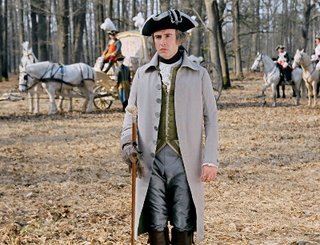 Steve Coogan, who was side splittingly joyous in the very fine “
Steve Coogan, who was side splittingly joyous in the very fine “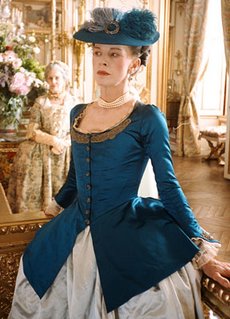
 The dressing scene alone is worth the price of admission.
The dressing scene alone is worth the price of admission. As the court gossips,
As the court gossips,  The
The  The famed exchange between the lowly du Barry and the grand Marie Antoinette is another perfectly staged moment in the film. As perfectly staged as it was in history. Which is a large part of the success of this film.
The famed exchange between the lowly du Barry and the grand Marie Antoinette is another perfectly staged moment in the film. As perfectly staged as it was in history. Which is a large part of the success of this film. The life at court was a complicated and regimented detail of what, how and when that perhaps explains better than any political manifesto the utter ridiculousness of the disparity between the royalty and the people of France. Obviously the clock is ticking on the royal family, and when the moment arrives we curiously found ourselves on the edge of our seats!
The life at court was a complicated and regimented detail of what, how and when that perhaps explains better than any political manifesto the utter ridiculousness of the disparity between the royalty and the people of France. Obviously the clock is ticking on the royal family, and when the moment arrives we curiously found ourselves on the edge of our seats!  It certainly wasn’t as if we were unaware of the final fate of the
It certainly wasn’t as if we were unaware of the final fate of the  Written & Directed by Sofia Coppola
Written & Directed by Sofia Coppola
